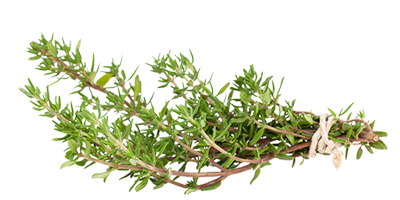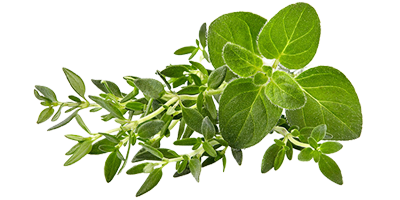Herbal Defense for Bacterial Infections
Our daily lives expose us to a constant risk of bacterial infections—from the variety of food and drinks we consume (especially on the go), travel and public spaces like airports, and closed-in environments with recirculated air, including offices, airplanes, and schools. All increase the likelihood of illnesses, including upper respiratory infections and harmful bacterial overgrowth in the digestive tract.
And, because of frequently used (or overused) antibiotics, bacteria have gotten pretty tough over the past 50 years. Fortunately, the right combination of strong, concentrated thyme and oregano plant oils can stop them.
Thyme (Thymus vulgaris): Fights Staph, Strep, and E. Coli
 While thyme is a well-known and commonly used herb in cooking, it also has incredible antibacterial, immune-strengthening, and symptom-reducing actions. Scientific study shows concentrated plant oil from thyme can inhibit some of the most dangerous bacterial strains, including methicillin-resistant Staphylococcus aureus (MRSA), a staph bacteria that resists antibacterial treatment, making it especially dangerous. But thyme can overcome what conventional drugs cannot. Researchers found that even at its lowest concentration, concentrated thyme oil reduced the bacteria by 53 percent. Higher concentrations of thyme knocked MRSA back even more—by 76 percent.
While thyme is a well-known and commonly used herb in cooking, it also has incredible antibacterial, immune-strengthening, and symptom-reducing actions. Scientific study shows concentrated plant oil from thyme can inhibit some of the most dangerous bacterial strains, including methicillin-resistant Staphylococcus aureus (MRSA), a staph bacteria that resists antibacterial treatment, making it especially dangerous. But thyme can overcome what conventional drugs cannot. Researchers found that even at its lowest concentration, concentrated thyme oil reduced the bacteria by 53 percent. Higher concentrations of thyme knocked MRSA back even more—by 76 percent.
Other research shows that thyme fights Streptococcus pyogenes, which causes strep throat, pneumonia, and life-threatening infections, and certain strains of Escherichia coli, responsible for serious digestive and urinary tract conditions and frequently cited in cases of food poisoning.
Inhibits Dangerous and Persistent Fungal Infections
While thyme boasts a wealth of beneficial compounds, two of its most active are thymol and carvacrol. In antifungal research, thymol is credited with much of the herb’s effectiveness. Thymol destabilizes the cell walls of fungi. As the walls break down, the fungus dies.
For anyone undergoing or recovering from surgery (especially organ transplants), or with compromised immune systems, fungal infections can be deadly. Thyme, and thymol specifically, strongly inhibits the development and germination of Rhizopus oryzae, a fungus that is potentially lethal to immunocompromised people, causing more than 70 percent of infections known as mucormycosis. While there are conventional drugs used to treat fungal infections (namely amphotericin B), they still have limited applications, and they cause side effects, including kidney toxicity.
Additionally, thyme stops Candida albicans, too. In one scientific study, even low concentrations of thyme oil and thymol cut Candida growth by 50 percent.
Stops Small Intestinal Bacterial Overgrowth (SIBO)
Small intestinal bacterial overgrowth (SIBO) can reduce nutrient absorption and make digestion difficult and uncomfortable, causing pain, gas, bloating, and either diarrhea or constipation. Antibacterial components, like thymol from thyme, and carvacrol in both thyme and oregano, not only treat SIBO effectively but have been found as effective as rifaximin, an antibiotic often prescribed to travelers suffering from food-borne illnesses. These herbs were also just as effective as triple-antibiotic therapy for those who don’t respond well to rifaximin.
Alleviates Respiratory Infection Symptoms
If you do get a respiratory illness, thyme can help you recover more easily. Its compounds, thymol and carvacrol, stop spasmodic coughing, relax airways in the lungs, strengthen the activity of the cilia to help loosen phlegm and keep mucus moving so you don’t feel stuffed up.
Overall, the multiple compounds in thyme act as antioxidants, scavenging free radicals and reducing the activity of oxidative enzymes that could make illness worse and weaken a strong immune response. They also have powerful, anti-inflammatory action, which also helps facilitate recovery.


Oregano (Origanum vulgare): Strengthens Your Defenses
 Various types of oregano have been studied worldwide, but whatever the species, they all share some basic compounds that fight harmful bacteria and boost your immune system’s ability to respond to infections.
Various types of oregano have been studied worldwide, but whatever the species, they all share some basic compounds that fight harmful bacteria and boost your immune system’s ability to respond to infections.
Stops Staph and Strep
Like thyme, oregano contains carvacrol, which means that it also has incredible antimicrobial actions and fights infections, including staph and strep. Researchers at Georgetown University concluded that oregano oil is highly effective against Staphylococcus aureus and may be considered a preventative or treatment for staph infections.
Boosts Antibiotic Effectiveness
In one study, researchers found combining the oil of oregano with a common antibiotic medication for typhoid, ciprofloxacin, enhanced the medication’s ability. This is critically important—not only for those at risk of that specific disease (which if left untreated, can have a mortality rate of up to 30 percent) but because like so many antibiotics, bacteria are developing resistance to this drug, making it less effective.
Fights Dangerous Infections and Stomach Flu
Other research shows that essential oil from oregano inhibits bacterial strains that are especially dangerous for individuals with cystic fibrosis, a condition with a serious burden on the lungs and immune system that causes a significantly increased risk of illness from infections.
The carvacrol in oregano oil can also stop strains of stomach flu (norovirus), one of the most common foodborne illnesses in the United States. Norovirus infections cause nausea, vomiting, and diarrhea, and are a serious risk for younger children, older adults, and anyone with a weakened immune system.
Battles Lyme Disease
Oregano may be effective against Lyme disease since it has been found to have inhibitory actions on Borrelia burgdorferi, the bacteria that causes the condition. Approximately 300,000 cases of Lyme disease are diagnosed each year in the United States, and up to 20 percent of those with the infection continue to have long-term, chronic symptoms.
That’s because conventional treatments can’t always kill off persistent forms of the bacteria, and it is those “persisters” that keep creating symptoms in people even after being treated with standard antibiotics. Antibiotics sometimes show very little value in fighting B. burgdorferi while it is in its “stationary phase.” However, the carvacrol content of oregano oil appears to push back against B. burgdorferi, even in small concentrations.
Defend Against Bacterial Infections
If you listen to some of the more frightening headlines out there, it may seem like bacterial superbugs are unstoppable, but they’re not. The concentrated plant oils of thyme and oregano are incredibly strong sources of immune-strengthening compounds that can stop bacterial, fungal, and viral infections. Both have been validated through generations of traditional use on one hand and leading science on the other. And both can defend you from stubborn and resistant illnesses and help you stay in good health, no matter the situation, place, or season.
